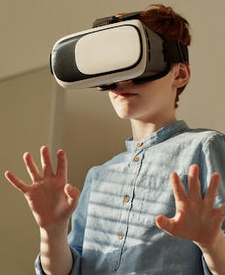The Digital Revolution: How Technology Transforms Online Entertainment
In the extensive and ever changing environment of the internet, technology has become the foundation of web entertainment, and is altering how we consume, interact with, and see digital content. The improvement of technology has not only widened the scope of entertainment but also introduced different ways of engaging the wide audience in diverse parts of the globe.
Streaming Services: The Era of TV and Music
Gone are the days when viewers had to follow the TV timetable or purchase albums to listen to their shows and music. New era companies such as Hulu, Apple Music, and Amazon Prime are now all accessible with one click.
The convenience and the diversity of these services have not only altered the consumption pattern of entertainment commodities, but also their production. Viral contents of streaming platforms have gained momentum, making traditional movie and music industries reinvent themselves in order to fight for their place.
With algorithm ability of personalized content recommendation, the originality of each user’s experience is guaranteed, hence, discovery is integrated into the entertainment journey.
The streaming technology will thus deliver more immersive experiences to the audience where the standard resolution of videos will be closer to high-definition and high-fidelity audio. Alternatively, the competitive market surrounding the platforms results in the creativity of new UI and improved accessibility, making the entertainment industry future look more user friendly than one could have ever imagined.
Gaming and Esports: More Than Just a Game
The gaming industry has seen a sky-rocketing development, changing from the simple pixelated games to complex, story-driven experiences that compete with traditional entertainment forms. Today, with platforms like Steam, Epic Games Store, and console-specific services, gamers have got unlimited access to an enormous selection of games, ranging from indie gems to blockbuster hits.
Moreover, the esports phenomenon has made gaming a viable competitive and spectator sport, with live streaming competitions pioneered by the likes of Twitch and YouTube Gaming.
This growth has been enabled by improvements in gaming technology, such as powerful graphics cards, faster internet, and cloud gaming platforms like Google stadia and NVIDIA GeForce now. These technologies improved not just graphics quality and gameplay ability, but also brought games to a wide public making high end hardware unnecessary.
In addition, social functionalities implemented in gaming platforms have developed a feeling of camaraderie among players. Gamers have an opportunity to connect with other players from all over the world through an online multiplayer mode, forums, and live chat and share their experiences, opinions and also compete with each other, thus enriching the gaming experience.
Virtual and Augmented Reality: Virtual Worlds at Our Fingertips
The Virtual Reality (VR) and Augmented Reality (AR) technologies provide a lot of attractive opportunities in the field of online entertainment, providing users with the experience that used to be almost impossible previously.
The virtual reality platforms, such as Oculus Rift and HTC Vive, enables users to step into completely realized digital worlds, to explore, interact, and even create content. At the same time, AR technologies are represented by such apps as Pokémon Go and Snapchat filters which insert digital content into the reality and make the latter better.
Such technologies have been used in other areas of applications, as well; for instance, virtual concerts, museum tours, and educational content have expanded the field of online entertainment. The interactive character of VR and AR provides a unique, first-person view, thus making digital experiences more attractive and unforgettable. Given that hardware is becoming more affordable and the content more diverse, VR and AR are surely the future of entertainment.
Social Media: Digital Hub
Social media platforms have evolved from basic networking sources into full-blown entertainment zones. TikTok, Instagram, and Facebook have endless supply of content, from short videos, live streams, interactive stories to news articles. The platforms have made content creation democratic and now anyone with a smartphone can showcase their talents, views and life experiences to the world.
Similarly, the interactive character of social media has brought about new forms of engagement, with things like polls, Q&As, and collaborative challenges, among others, creating a two-way dialogue between creators and consumers. In this manner, online entertainment is not only more interactive, but also makes the distinctions between consumers and creators blur, as the user-generated content is as powerful now as the traditional media.
In the field of online casinos, technological improvements have considerably improved user experience. A Unibet review might show how smooth integration, safe payment gateways, and engaging games shape popular and trustworthy online gambling platforms, representing the combination of technology and entertainment in this particular market.
Artificial Intelligence and Machine Learning Functions
AI and ML are silently changing the face of online entertainment, providing the algorithms behind content recommendations, chatbots, and even content creation. AI, used by platforms such as Netflix and Spotify, analyzes user behavior and preferences, creating customized lists of movies, TV shows, and music so that there is always something new and interesting to discover.
AI also enables the birth of new content in the form of tools that are able to produce music, write scripts and draw art, stretching the envelopes of creativity and collaboration. Simultaneously, ML technologies are elevating the interaction in games, and virtual experiences, where non-player characters are more reactive and realistic, hence improving the overall realism of digital worlds.
These technologies not only improve the user experience but provide information about consumer behavior, allowing the creators and platforms to understand their audience needs and wants more effectively. With the continual advancement of AI and ML, they are expected to offer a more personalized, interactive, and creative entertainment experience in the online world.
Conclusion
The influence of innovative technologies on internet entertainment is overwhelming and comprehensive, and changes every side of digital content creation, consumption, and interaction. Technology has led to the creation of streaming services’ convenience, VR and AR’s immersive worlds, the interactive feature of social media, and innovations driven by AI and ML that have made online entertainment more accessible, engaging, and diverse than it has ever been. Going forward, technology will be seen as the key player in the world of online entertainment, offering a variety of opportunities to the audience around the globe.





















